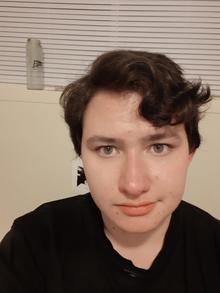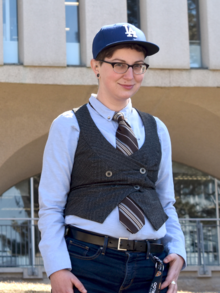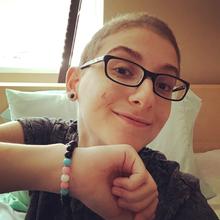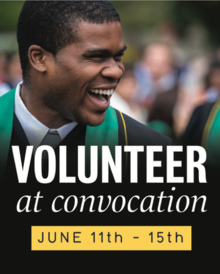The Daily Bulletin is published by Internal and Leadership Communications, part of University Communications
Contact us at bulletin@uwaterloo.ca
Submission guidelines
Editor:
Brandon Sweet
University Communications
bulletin@uwaterloo.ca
A message from the Equity Office.
International Transgender Day of Visibility (TDOV) is commemorated on March 31. It is a day to celebrate trans people, and raise awareness about the discrimination faced by trans people around the world. To commemorate TDOV this year, the Equity Office interviewed three trans members of our community to understand what this day means to them and how we can all be more inclusive and supportive of the trans members of our campus and broader community.
 When we asked Alex, Advocacy Director for Glow, why this day is important, he said “Regardless of all these really negative statistics and stereotypes we hear about trans people, we can really be important members of society and the community. Trans individuals have a lot to offer, but aren’t always welcome in all spaces. I really just see it as a day to highlight some positive things about trans people and take the focus off suicide and mental health. Transgender people are people, so just talk to us.”
When we asked Alex, Advocacy Director for Glow, why this day is important, he said “Regardless of all these really negative statistics and stereotypes we hear about trans people, we can really be important members of society and the community. Trans individuals have a lot to offer, but aren’t always welcome in all spaces. I really just see it as a day to highlight some positive things about trans people and take the focus off suicide and mental health. Transgender people are people, so just talk to us.”
When Alex moved to Waterloo from a smaller town to begin university, it was an experience that left him feeling unsure of whether he wanted to keep his identity private. Alex was put in touch with a trans professor on campus, and found the exchange refreshing: “That was a really positive experience for me. It was a really positive experience to see someone so alive and thriving, since those words aren’t always attributed to members of the transgender community.”
While TDOV is a day of celebration and increased visibility, Alex notes there continues to be major barriers facing the trans community, one being the legal changing of one’s given name to their preferred name. “Names can be powerful and have negative connotations.”
In terms of promoting inclusion for trans folks, Alex’s advice was simple: “Try to listen. Try to be mindful of the language you’re using and the way you’re discussing trans people.”
 Jordan started living openly as trans in their thirties: “It’s never too late to start to be yourself. If you’ve ever had questions about your gender, dive into it if you’re comfortable. It’s never too late.”
Jordan started living openly as trans in their thirties: “It’s never too late to start to be yourself. If you’ve ever had questions about your gender, dive into it if you’re comfortable. It’s never too late.”
Thinking of TDOV alongside Trans Day of Remembrance in November is an opportunity for Jordan to celebrate that they are able to live life in a body most comfortable to them: “I have so many privileges that I have to be thankful for, like my (gender-neutral) name, which helps from the admin side. I’m white, I have a good job, a great partner. It’s necessary to reflect on how much that helps me because there is so far we have to go - as a society, as communities, as institutions - to ensure that all of us are treated with the same humanity, which definitely isn’t the case for those living as trans women of colour for example.”
Jordan has a supportive group of colleagues who have welcomed them without judgement. “I like the work I do, I’m happy to be their colleague and I’m just myself…I’ve been grateful that in my short time at Waterloo, I’ve been welcomed and trusted, and my suggestions have been taken seriously.”
Nevertheless, Jordan does identify barriers on campus, including gendered washrooms and databases: “Gender doesn’t fit neatly in database fields. We need to move away from thinking of ourselves as ‘either/or’ and toward ‘How do I feel from day to day, from decade to decade? Will I change over time? What will happen if I let myself explore gender a little more?’ We need the people thinking that way designing our bathrooms and databases.”
“When we tell you who we are, believe us. When we come to you with suggestions and experiences of how we move through space and navigate systems, just listen and ask: “What can we do to make this easier?”
 Lee views TDOV as a day to promote visibility of trans folks: “It’s hard to talk about being trans outside of the community. Having a day that is known widely is helpful to be like ‘Here’s a reason to talk about being trans and to talk about my experiences’, especially because I feel weird about being trans on a daily basis.”
Lee views TDOV as a day to promote visibility of trans folks: “It’s hard to talk about being trans outside of the community. Having a day that is known widely is helpful to be like ‘Here’s a reason to talk about being trans and to talk about my experiences’, especially because I feel weird about being trans on a daily basis.”
Lee emphasizes that his experience is not every trans person's, and that he is privileged in many ways making his experience different than others.” Nevertheless, the recurrent issue of his preferred name not being used over his legal name has been a source of distress: “My negative experiences come from my name. That’s one of the worst things at the moment. Our entire system is broken when it comes to names because even though some people will ask if you have a preferred name it doesn’t necessarily follow through to other systems.”
Speaking to positive experiences on campus, Lee shares that the most positive moments have generally occurred at the individual level. “Small examples would be my preferred name not being on the course list so I have to go and explain, and having my professors be really understanding about that. That’s one of the most memorable experiences. One professor immediately asked my pronouns, which happens so rarely because people don’t think about it.”
Lee offers some strategies for making campus more inclusive for trans folks:
Lee shares that Glow is a good space to talk about any trans-specific issues and to meet other queer people.
To learn more about how you can be a better ally to the LGBTQ+ community, consider attending a Making Spaces Workshop and read this article on the importance of using chosen names.
A message from Community Relations and Events.
 Staff and students from across campus are encouraged to come together and volunteer in the celebration of our proud graduands, honorary guests, award winners, and their friends and families during Convocation 2019. Be part of the history as Convocation is one of the longest University of Waterloo traditions, and largest events on campus that requires a team of over 120 volunteers. Support the Convocation volunteer team to create a smooth and successful send off for our new alumni by volunteering your time and talents.
Staff and students from across campus are encouraged to come together and volunteer in the celebration of our proud graduands, honorary guests, award winners, and their friends and families during Convocation 2019. Be part of the history as Convocation is one of the longest University of Waterloo traditions, and largest events on campus that requires a team of over 120 volunteers. Support the Convocation volunteer team to create a smooth and successful send off for our new alumni by volunteering your time and talents.
Convocation is held in the Physical Activities Complex and will have multiple ceremonies from Tuesday, June 11 to Saturday, June 15 with many roles to choose from.
If you are interested in joining the Convocation volunteer team, visit the Convocation volunteer website to learn more and register to be a volunteer.
Take the red pill: The Matrix at 20
Computer science seminar, ShallowForest: Optimizing all-to-all data transmission in WANs, Hao Tan, David R. Cheriton School of Computer Science, Monday, April 1, 4:00 p.m., DC 2585.
Coping Skills Seminar - Challenging Thinking, Monday, April 1, 4:00 p.m., HS 2302.
WaterTalk: Use of quantitative resilience in managing urban infrastructure response to natural hazards, delivered by Prof. Slobodan Simonovic, Tuesday, April 2, 11:00 a.m., DC 1302.
Campus Access: Rights and Resources, Tuesday, April 2, 1:30 p.m., NH 1403.
Board of Governors meeting, Tuesday, April 2, 1:30 p.m., NH 3407.
Stratford Campus Project Showcase, Tuesday, April 2, 4:00 p.m., Stratford School of Interaction Design and Business.
MMI Simulation, Tuesday, April 2, 5:30 p.m., TC 1214.
Global Engagement Seminar Program Summit on the "Socio-Cultural and Political Implications of Artificial Intelligence", Wednesday, April 3 and Thursday, April 4, Balsillie School of International Affairs.
Research Ethics drop-in training session, Wednesday, April 3, 10:00 a.m. to 12:00 p.m., Dana Porter Library.
Webinar: Copyright and Your Thesis, Wednesday, April 3, 10:30 a.m.
Co-op Tool UX Testing, Wednesday, April 3, 12:30 p.m., TC 1112.
Communication Speaks! Colloquium featuring Shana McDonald and David Janzen, Wednesday, April 3, 1:00 p.m., EV2 2002.
Balinese Gamelan Ensemble Concert, Wednesday, April 3, 7:30 p.m., Humanities Theatre.
Waterloo Institute for Complexity and Innovation’s WICI Complex Systems Student Project Symposium, Thursday, April 4, 12:00 p.m., SNC 0801.
“Sulphur Water” and the Legacy Gas Wells of Southwestern Ontario, delivered by Prof. Maurice Dusseault and Richard Jackson, Thursday, April 4, 2:30 p.m., QNC 1501.
FINE / CS 383 Computational Digital Art Capstone Exhibition, Wednesday, April 3, 4:00 p.m. to 7:00 p.m., Communitech, 151 Charles Street West, Kitchener.
Turn Your Research Into a Startup, "A panel of previous graduate students discussing how they were able to monetize their research and enter the startup world," Thursday, April 4, 4:30 p.m., QNC 0101.
NEW - Math Exchange Roundtable, Hear from Math students who have studied overseas. Thursday, April 4, 5:00 p.m. to 6:30 p.m., DC 1302.
German and Austrian Masterpieces: orchestra@uwaterloo, Thursday, April 4, 7:30 p.m., Humanities Theatre.
NEW - Webinar - Careers in Government Series: A Q&A with Colin Spencer James of Employment and Social Development Canada, Friday, April 5, 11:00 a.m.
Office of Human Rights, Equity, and Inclusion presents Ela Smith, “You Don’t Know What You Don’t Know” Part One, Friday April 5, 1:00 p.m. to 4:00 p.m., GSC 1151.
Knowledge Integration Senior Research Project Symposium, Friday, April 5, 4:00 p.m. to 6:00 p.m., Environment 3 atrium.
NEW - Lectures in Catholic Experience presents Janna Levitt,
NEW - 2019 SMF Research Symposium, Saturday, April 6, St. Jerome's Academic Centre.
The Nature of Experiment: Intelligence, Life and the Human, Monday, April, 8, 9:30 a.m. to 6:30 p.m., Hagey Hall.
WaterTalk: Smart Earth: New frontiers in water governance in a wired world, delivered by Prof. Karen Bakker, Monday, April 8, 2:30 p.m., DC 1302.
NEW - Coping Skills Seminar - Thriving With Emotions, Monday, April 8, 4:00 p.m., HS 2302.
NEW - Planning your research trajectory: Strategies for success (for researchers in the first three years of a tenure-track appointment) Tuesday, April 9, 9:00 a.m. to 12:00 p.m., DC 1301/DC 1302. Please register to attend.
The Daily Bulletin is published by Internal and Leadership Communications, part of University Communications
Contact us at bulletin@uwaterloo.ca
Submission guidelines
The University of Waterloo acknowledges that much of our work takes place on the traditional territory of the Neutral, Anishinaabeg, and Haudenosaunee peoples. Our main campus is situated on the Haldimand Tract, the land granted to the Six Nations that includes six miles on each side of the Grand River. Our active work toward reconciliation takes place across our campuses through research, learning, teaching, and community building, and is co-ordinated within the Office of Indigenous Relations.